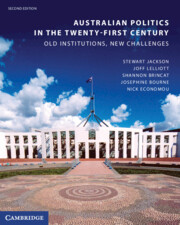Refine search
Actions for selected content:
36901 results in Cambridge Textbooks
Place Names: Alternative Spellings
-
- Book:
- India before Europe
- Published online:
- 15 September 2022
- Print publication:
- 08 September 2022, pp xxvii-xxviii
-
- Chapter
- Export citation
3 - Southern India in the Age of Vijayanagara, 1350–1550
-
- Book:
- India before Europe
- Published online:
- 15 September 2022
- Print publication:
- 08 September 2022, pp 62-97
-
- Chapter
- Export citation
Brief Contents
-
- Book:
- The Fundamentals of Social Research
- Published online:
- 07 October 2022
- Print publication:
- 08 September 2022, pp vii-viii
-
- Chapter
- Export citation
Preface to First Edition
-
- Book:
- India before Europe
- Published online:
- 15 September 2022
- Print publication:
- 08 September 2022, pp xiii-xvi
-
- Chapter
- Export citation
Copyright page
-
- Book:
- India before Europe
- Published online:
- 15 September 2022
- Print publication:
- 08 September 2022, pp iv-iv
-
- Chapter
- Export citation
8 - Transnational Legal Practice
-
- Book:
- Transnational Law
- Published online:
- 12 November 2022
- Print publication:
- 08 September 2022, pp 581-670
-
- Chapter
- Export citation
6 - Measuring Concepts of Interest
-
- Book:
- A Stata Companion for <i>The Fundamentals of Social Research</i>
- Published online:
- 29 September 2022
- Print publication:
- 08 September 2022, pp 27-29
-
- Chapter
- Export citation
9 - Bivariate Hypothesis Testing
-
- Book:
- An R Companion for <i>The Fundamentals of Social Research</i>
- Published online:
- 23 September 2022
- Print publication:
- 08 September 2022, pp 48-58
-
- Chapter
- Export citation
10 - Two-Variable Regression Models
-
- Book:
- The Fundamentals of Social Research
- Published online:
- 07 October 2022
- Print publication:
- 08 September 2022, pp 177-200
-
- Chapter
- Export citation
12 - Putting It All Together to Produce Effective Research
-
- Book:
- The Fundamentals of Social Research
- Published online:
- 07 October 2022
- Print publication:
- 08 September 2022, pp 246-266
-
- Chapter
- Export citation
5 - Survey Research
-
- Book:
- A Stata Companion for <i>The Fundamentals of Social Research</i>
- Published online:
- 29 September 2022
- Print publication:
- 08 September 2022, pp 26-26
-
- Chapter
- Export citation
Dedication
-
- Book:
- The Fundamentals of Social Research
- Published online:
- 07 October 2022
- Print publication:
- 08 September 2022, pp v-vi
-
- Chapter
- Export citation
Acknowledgments
-
- Book:
- The Fundamentals of Social Research
- Published online:
- 07 October 2022
- Print publication:
- 08 September 2022, pp xxiv-xxvi
-
- Chapter
- Export citation
11 - Multiple Regression
-
- Book:
- An R Companion for <i>The Fundamentals of Social Research</i>
- Published online:
- 23 September 2022
- Print publication:
- 08 September 2022, pp 63-75
-
- Chapter
- Export citation
Contents
-
- Book:
- An R Companion for <i>The Fundamentals of Social Research</i>
- Published online:
- 23 September 2022
- Print publication:
- 08 September 2022, pp vii-ix
-
- Chapter
- Export citation
Figures
-
- Book:
- The Fundamentals of Social Research
- Published online:
- 07 October 2022
- Print publication:
- 08 September 2022, pp xvi-xvii
-
- Chapter
- Export citation
2 - The Art of Theory Building
-
- Book:
- An SPSS Companion for <i>The Fundamentals of Social Research</i>
- Published online:
- 23 September 2022
- Print publication:
- 08 September 2022, pp 12-24
-
- Chapter
- Export citation
Table of Excerpts
-
- Book:
- Transnational Law
- Published online:
- 12 November 2022
- Print publication:
- 08 September 2022, pp xix-xxx
-
- Chapter
- Export citation
Biographical Notes
-
- Book:
- India before Europe
- Published online:
- 15 September 2022
- Print publication:
- 08 September 2022, pp 373-377
-
- Chapter
- Export citation

Australian Politics in the Twenty-First Century
- Old Institutions, New Challenges
-
- Published online:
- 06 September 2022
- Print publication:
- 02 September 2022
-
- Textbook
- Export citation
